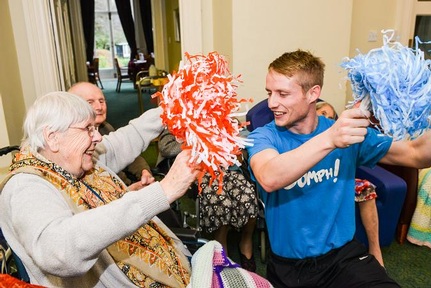Profile: ‘People should not be dreading going into a care home – they should be looking forward to it,’ says care home boss
As it becomes increasingly difficult for people wanting to go into care homes to access funding from the local authorities, the competition among privately-funded care providers continues to grow and, says Signature executive chairman, Tom Newell, it looks increasingly like that paying for care will be the shape of things to come.

“One good argument for privately funded care is that the competition between care home providers encourages higher standards and this in itself increases the quality of care,” says Mr Newell who has been with Signature since 2008 and presided over a period of steady growth.
“The UK self-pay market is still very underserved – there is room for more competition and competition is good. More good competition will only help improve the industry standard and the reputation of the industry, which will help us all attract more customers,” comments Mr Newell.
The reasons for these developments are in many ways a foregone conclusion, he explains. “I’ve been actively involved in the UK market since the late 1990s and during this time the biggest change is the steady and inevitable withdrawal of Government funding for residents wishing to go into care homes – due to demographic and fiscal pressures that are not likely to abate anytime soon. This is broadly true across the world.
“This withdrawal has been done by means testing and an apparent increase in the difficulty of qualifying for Continuing Health Care funding, leading people to seek privately funded alternatives. This, in turn, has resulted in a demand for better quality.”
“The rapid growth in the aged population, partly caused by lengthening of life expectancy, has created the reality that if you can pay for your own care you’ll be likely to be asked to do so. We may in time see long term care insurance becoming a major source of funding, as it is in the United States.”
Quality is key
The future for multi award-winning Signature looks bright. Its recent accolades include Senior Lifestyle winner of the UK Over 50s Housing Award 2014, and gaining a coveted listing in the ‘top 1,000 companies to inspire Britain’.

Being at the luxury end of the market means charging premium rates, and enables Signature to back up its mission statement to provide care of the highest quality. Of course, a place at a Signature home does not come cheap. With average fees as high as £1,500 a week, it is beyond the reach of those receiving council funding as well as many self-funders. But with the baby boomer, property-rich generation now reaching retirement age, the care sector clearly believes there is demand for high-end services.
Mr Newell says: “Care is not a big enough word to describe what we offer at Signature. More than anything we want to make a positive difference in the lives of our residents and offer true person-centred care, including nursing and dementia care, in a beautiful residential environment.
By the end of January 2015, Signature will have nine homes in the UK, mostly in London and the home counties, and six more are in various stages of development and planned to open in the course of the next three years. “We believe purpose built is the way forward, as we are able to offer the best facilities and try and improve each building, one on the other, as we learn what really works for our residents,” says Mr Newell. Each new home costs around £25million to build and says Mr Newell: “That’s spending more than most.” He adds: “Our rooms are generous in size. For instance a typical one-bedroom apartment measures around 40 sq. metres. Staffing of the homes is also generous with the company aiming to have more than one employee per resident.
“We have no desire to ever be the biggest care home operator, or even one of the biggest. We want to continue to build and operate a unique portfolio of very special homes. We have the funding to grow faster, but are more comfortable with a ‘slow and steady’ pace.”
People come first
Not least is the investment Signature makes in itspeople. Mr Newell says: “In this business, people very much drive your success and we think that the quality of our people, who we attract by offering a positive, inspiring culture, good benefits and career development , are the most important factor in our success.
“We pay well, offer good training and work in a beautiful environment and can accommodate flexible work schedules. In all I believe that all this attracts the right employees who have a big heart for the business.
His words are backed up by the fact that a recent survey of Signature employees returned a 90 per cent ‘highly satisfied ‘rating – and a willingness to recommend Signature as a place to work. Significantly a recent residents’ survey also returned an extremely high satisfaction rating. More than 90 per cent of our residents would recommend Signature homes as a place to live.”

As Mr Newell says: “Our care homes are holistic – we offer not only beautiful environments, excellent food and a fine restaurant-style dining experience, but also a truly wide selection of activities that range from theatre trips and visits to the sea side to snake charmers and belly dancers.
“People should not be dreading going into a care home – they should be looking forward to it as it often provides important benefits such as socialization, support, and obviously care. With the improved standards and hopefully more and better industry publicity that comes with competition, it is to be hoped that this will happen.”
Interesting facts
First job: In Springfield, Virginia as a dishwasher at a Howard Johnsons restaurant for what I thought at the time was the enormous sum of $1.55 per hour!
Favourite book: Tolkien’s Lord of the Rings trilogy
Favourite film: Casablanca
Favourite piece of music: Fleetwood Mac’s Landslide
Best present received: A really ugly purple ceramic monster made for me by my daughter as her first Father’s Day present. I still have it on display to this day.
Last holiday: Hiking and sightseeing (and Brunello tasting) in Tuscany in the summer
Latest Profiles News
 05-Sep-16
Being chief executive of a care home provider is a 'huge responsibility and privilege'
05-Sep-16
Being chief executive of a care home provider is a 'huge responsibility and privilege'
 31-Mar-15
Profile: 'Both local and national Government needs to put its money where its mouth is,' says chair of the National Care Association
31-Mar-15
Profile: 'Both local and national Government needs to put its money where its mouth is,' says chair of the National Care Association
 16-Dec-14
Profile: Care home turnaround specialist reveals some of the tricks of the trade
16-Dec-14
Profile: Care home turnaround specialist reveals some of the tricks of the trade
 01-Dec-14
Profile: ‘People should not be dreading going into a care home – they should be looking forward to it,’ says care home boss
01-Dec-14
Profile: ‘People should not be dreading going into a care home – they should be looking forward to it,’ says care home boss
 07-Oct-14
Exercise is key to 'changing the care sector' says provider of exercise therapy in care homes
07-Oct-14
Exercise is key to 'changing the care sector' says provider of exercise therapy in care homes